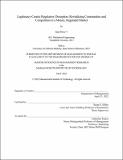Legitimacy-Centric Regulatory Disruption: Revitalizing Communities and Competition in a Mature, Regulated Market
Author(s)
Rixey V, Eppa
DownloadThesis PDF (539.5Kb)
Advisor
Silbey, Susan S.
Terms of use
Metadata
Show full item recordAbstract
As basic functions of society are increasingly coordinated through private firms, how can we ensure they support broadly shared prosperity in our communities? Regulation is a common, albeit contested, answer to this question, in part because the largest firms use coercive means to limit and capture regulation via rent-seeking processes, undermining regulatory efforts and harming both entrepreneurship and local communities. This longitudinal case study shows that some small and innovative firms also successfully influence regulation, but, instead of directly challenging or capturing their regulatory environment, they embrace social responsibilities and collaboratively develop systems of accountability to support adaptive regulation. By shifting authority from a state agency to local regulators and adopting a pragmatic rather than strictly neo-liberal market orientation, craft brewers opened a mature, regulated market to change and locally shared value creation. Establishing prosocial reputations via experimental efforts to open taprooms or beer gardens and promoting reinterpretation of these new organizational forms in the wake of successful experiments, craft breweries shifted local perceptions of their businesses from liabilities needing control to community assets worthy of promotion. Together these tactics constitute a new process of legitimacy-centric regulatory disruption, which is elaborated in a model. This discretionary, legitimacy-centric process offers a new way to conceive of how firms promote regulatory change and contributes to our understanding of the relationships between corporate social innovations and industry regulations. The potential for discrimination is also discussed by analyzing how female and minority owned breweries experience this process of creating both financial and community value.
Date issued
2022-05Department
Sloan School of ManagementPublisher
Massachusetts Institute of Technology